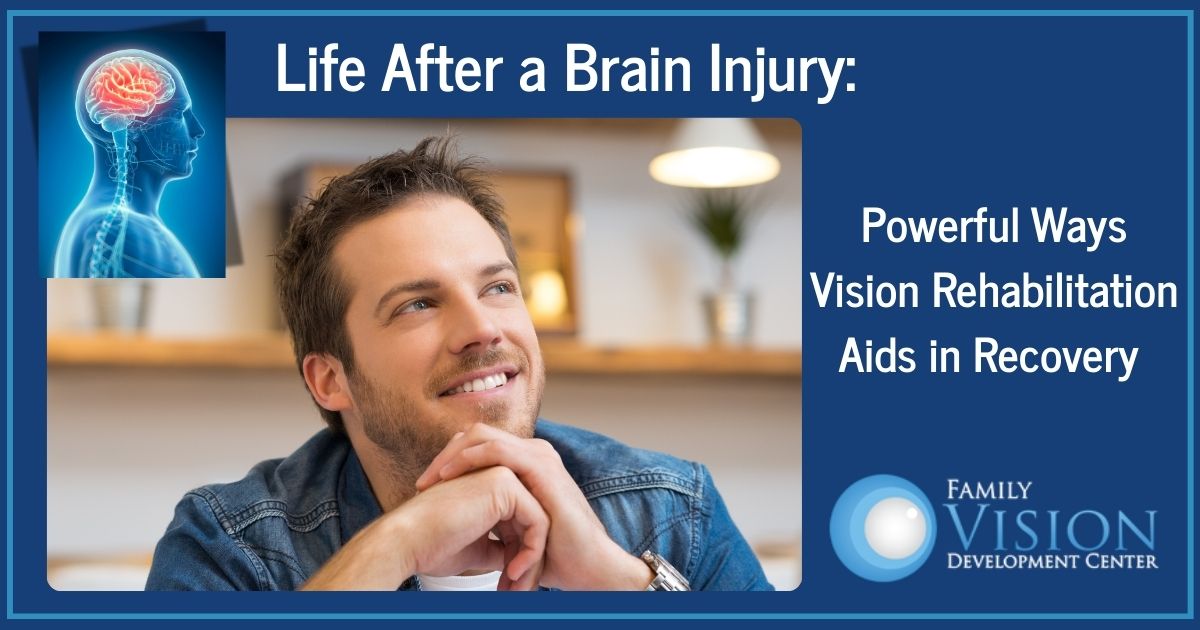A brain injury can change your life in an instant, and the effects often linger in ways that are difficult to explain. If you’ve experienced a concussion, stroke, or other form of traumatic brain injury (TBI), you may be dealing with symptoms like blurred vision, dizziness, light sensitivity or trouble concentrating. What many people don’t realize is that these symptoms are often tied to disruptions in the visual system – and that’s where neuro-optometric vision rehabilitation can help.
The Link Between a Brain Injury and Vision
Vision isn’t just about how clearly you can see. It’s about how your eyes and brain work together to interpret the world around you. In fact, more than 50% of the brain is involved in visual processing, which makes the visual system especially vulnerable following a brain injury.
Even a mild concussion can disrupt:
- Eye tracking (following a moving object)
- Eye teaming (how your eyes work together)
- Depth perception and spatial awareness
- Visual memory and processing speed
- The ability to shift focus between near and far objects
When these systems are out of sync, the results can be frustrating, and sometimes debilitating. You may feel dizzy in crowds, overwhelmed by motion, or unable to read or drive for long periods. These symptoms often go undiagnosed because they don’t show up on standard eye exams.
How Vision Rehabilitation Helps the Brain Heal
Neuro-optometric vision rehabilitation is a specialized therapy designed to retrain the visual system and restore its connection with the brain and body. Unlike glasses or contacts, which correct clarity, this type of vision therapy focuses on functional vision, which is how well your eyes and brain communicate and work together in daily life.
A personalized rehabilitation program following a brain injury may include:
- Eye movement and tracking exercises
- Activities to improve balance and coordination
- Tools like prism lenses or light therapy
- Exercises that help integrate vision with movement and cognition
Over time, these targeted therapies help reduce symptoms, restore visual function, and improve overall brain-body coordination.
Expected Improvements Following Vision Rehabilitation
Neuro-optometric vision rehabilitation helps individuals regain their independence and quality of life after a brain injury. With consistent treatment, patients often notice:
- Less dizziness and disorientation
- Improved reading and concentration
- Better coordination and balance
- Reduced light sensitivity and headaches
- Increased confidence in crowded or visually complex environments
Because each brain injury is unique, the treatment plan is customized based on a comprehensive neuro-optometric evaluation.
A brain injury can be overwhelming but recovery is definitely possible. Vision rehabilitation offers a powerful, non-invasive approach to healing that addresses the hidden visual problems that hold many people back. At Family Vision Development Center, we have extensive knowledge and training in this type of treatment and are able to help restore proper vision for patients of all ages, tailoring their plans to help them regain their quality of life as efficiently and quickly as possible.
If you have experienced any kind of brain injury, don’t let your vision go untreated. Contact our office at 630-862-2020 to schedule a comprehensive evaluation and take the next step toward restoring clarity, balance, and control in your life.
Family Vision Development Center is a full-service vision center offering innovative vision therapy services, sports vision therapy services, post-concussive vision rehabilitation, comprehensive vision exams for eyeglasses and contact lenses, management of ocular diseases including glaucoma, diabetes, macular degeneration and cataracts, and a state-of-the-art optical center offering the latest designs in eyewear. We are dedicated to keeping our patients comfortable and well-informed and we will explain every exam and procedure and answer all of your questions. We accept both scheduled and emergency appointments, and offer convenient financing and insurance options to ensure that high-quality vision care is available and affordable to all of our patients.

